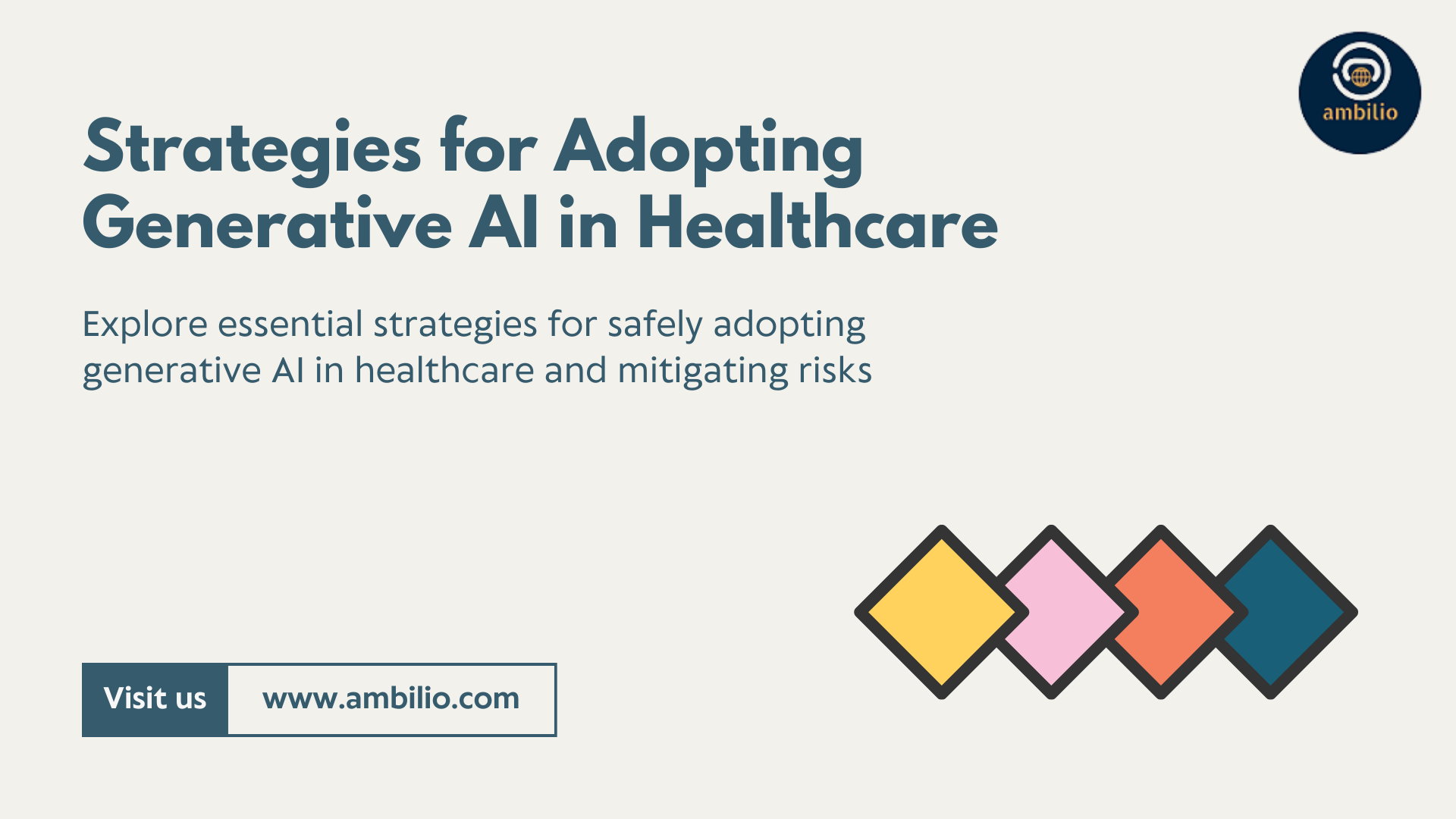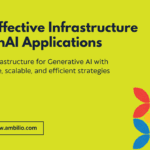Generative AI is a transformative technology with the potential to revolutionize the healthcare industry. It can enhance how healthcare stakeholders work and operate, streamline processes, and improve patient outcomes. However, adopting generative AI in healthcare comes with its own set of risks and challenges. Understanding these risks and developing strategies to mitigate them is crucial for successful implementation and scale-up. Effective adoption requires addressing concerns related to privacy, regulatory compliance, clinical outcomes, investment, and proof of value. This article explores the top risk considerations and strategies for adopting generative AI in healthcare.
Risk Considerations When Adopting Generative AI in Healthcare
1. Privacy and Data Security
One of the foremost concerns when adopting generative AI in healthcare is privacy and data security. Healthcare data is highly sensitive, and any breach can have severe consequences, including legal repercussions and loss of trust. Generative AI systems require vast amounts of data to function effectively, and ensuring this data is securely stored and processed is paramount.
2. Regulatory Compliance
Healthcare is a highly regulated industry, with stringent laws governing patient data and clinical practices. Regulatory compliance is a significant hurdle for healthcare organizations adopting generative AI. Ensuring that AI systems comply with regulations like HIPAA (Health Insurance Portability and Accountability Act) is critical to avoid legal issues and ensure patient safety.
3. Clinical Outcomes and Patient Safety
The impact of generative AI on clinical outcomes and patient safety is another major concern. AI systems can assist in diagnosis, treatment planning, and patient management, but any errors or inaccuracies can lead to adverse patient outcomes. Ensuring that AI systems are reliable, accurate, and capable of supporting clinical decisions without compromising patient safety is essential.
4. Investment and Capability Building
Adopting generative AI in healthcare requires significant investment in technology, infrastructure, and talent. Many healthcare organizations may lack the necessary resources or capabilities to implement AI effectively. Building the required infrastructure and developing the expertise to manage and maintain AI systems are critical challenges that need to be addressed.
5. Proof of Value
Demonstrating the value of generative AI in healthcare is essential for its adoption and scale-up. Healthcare organizations need to validate the effectiveness of AI systems in improving clinical outcomes, operational efficiency, and patient satisfaction. Without clear proof of value, it can be challenging to secure the necessary investment and support for AI initiatives.
Strategies to Mitigate Risks When Adopting Generative AI in Healthcare
1. Implement Robust Data Security Measures
To address privacy and data security concerns, healthcare organizations must implement robust data security measures. This includes encrypting data at rest and in transit, employing advanced authentication mechanisms, and regularly auditing security practices. Additionally, organizations should adopt a zero-trust security model, ensuring that only authorized personnel have access to sensitive data.
2. Ensure Regulatory Compliance
Healthcare organizations must ensure that their AI systems comply with relevant regulations. This involves staying up-to-date with regulatory requirements, conducting regular compliance audits, and working closely with legal and regulatory experts. Organizations should also consider implementing AI governance frameworks that outline policies and procedures for managing AI systems in compliance with regulations.
3. Focus on Clinical Validation
To mitigate risks related to clinical outcomes and patient safety, healthcare organizations should focus on clinical validation of AI systems. This involves conducting rigorous testing and validation studies to assess the accuracy, reliability, and effectiveness of AI solutions. Collaborating with clinical experts and integrating AI systems into clinical workflows with proper oversight can help ensure that AI supports, rather than hinders, clinical decision-making.
4. Invest in Infrastructure and Talent
Adopting generative AI in healthcare requires investment in both technology and talent. Healthcare organizations should invest in the necessary infrastructure, including high-performance computing systems, data storage solutions, and AI development platforms. Additionally, organizations should focus on building a skilled workforce by providing training and development opportunities for existing staff and recruiting new talent with expertise in AI and data science.
5. Demonstrate and Communicate Value
To secure support for AI initiatives, healthcare organizations must demonstrate and communicate the value of generative AI. This involves conducting pilot projects to showcase the potential benefits of AI, such as improved patient outcomes, operational efficiencies, and cost savings. Collecting and presenting evidence of AI’s impact through case studies and performance metrics can help build a compelling business case for broader adoption.
6. Develop Governance and Risk Management Frameworks
Establishing governance and risk management frameworks is essential for managing the risks associated with generative AI. Healthcare organizations should develop comprehensive frameworks that include policies for data management, ethical AI usage, and risk mitigation strategies. These frameworks should also outline procedures for monitoring and evaluating AI systems to ensure ongoing compliance and performance.
7. Foster a Culture of Innovation and Collaboration
Creating a culture of innovation and collaboration can help healthcare organizations effectively adopt generative AI. Encouraging cross-functional teams to work together on AI projects can foster creativity and ensure that diverse perspectives are considered. Organizations should also engage with external partners, such as technology vendors, academic institutions, and industry consortia, to stay abreast of the latest developments and best practices in AI.
8. Monitor and Evaluate AI Systems Continuously
Continuous monitoring and evaluation of AI systems are crucial for ensuring their ongoing effectiveness and safety. Healthcare organizations should implement monitoring mechanisms to track the performance of AI systems in real-time and identify any issues or anomalies. Regularly reviewing and updating AI models and algorithms can help maintain their accuracy and relevance.
9. Educate and Engage Stakeholders
Educating and engaging stakeholders, including clinicians, patients, and regulatory bodies, is vital for the successful adoption of generative AI in healthcare. Providing training and resources to clinicians can help them understand and effectively use AI tools. Engaging patients and addressing their concerns about AI can build trust and acceptance. Collaborating with regulatory bodies to address compliance challenges can also facilitate smoother adoption.
10. Prioritize Ethical Considerations
Ethical considerations should be at the forefront when adopting generative AI in healthcare. This includes ensuring transparency in AI decision-making processes, addressing biases in AI models, and maintaining patient autonomy and privacy. Developing ethical guidelines and principles for AI usage can help organizations navigate the ethical complexities associated with AI.
Final Words
Adopting generative AI in healthcare offers immense potential to transform the industry, but it also comes with significant risks. By understanding and addressing these risks through robust data security measures, regulatory compliance, clinical validation, investment in infrastructure and talent, and effective communication of AI’s value, healthcare organizations can successfully navigate the challenges. Establishing governance and risk management frameworks, fostering a culture of innovation and collaboration, and prioritizing ethical considerations are also critical for ensuring the safe and effective adoption of generative AI in healthcare. With careful planning and strategic implementation, generative AI can become a powerful tool for enhancing healthcare delivery and improving patient outcomes.



